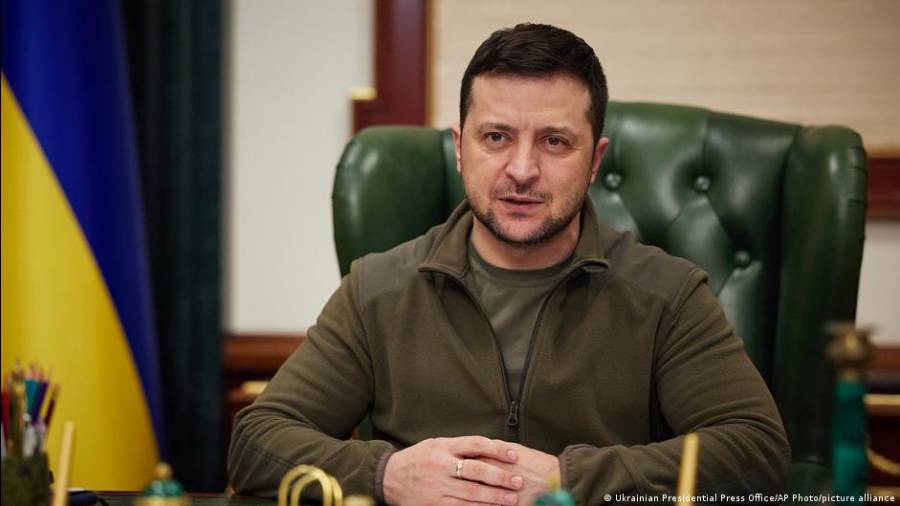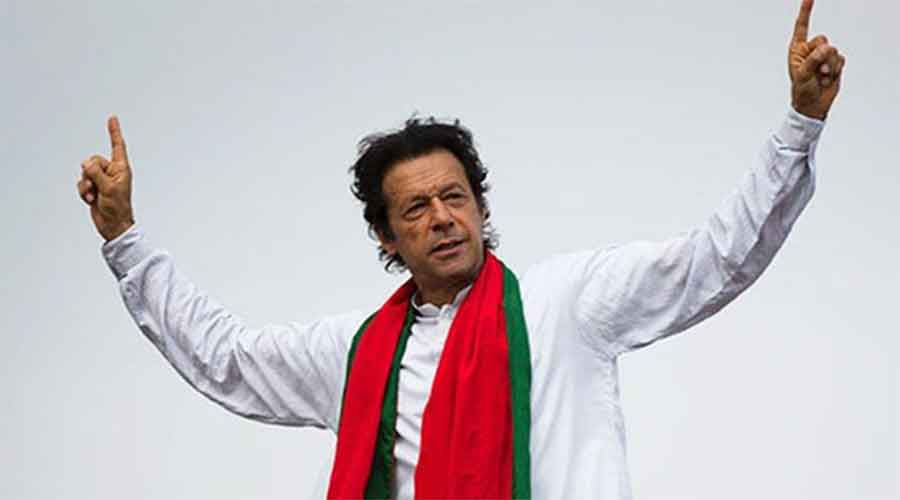Pakistan's embattled Prime Minister Imran Khan on Tuesday strictly directed his party lawmakers to either abstain or not attend the National Assembly session on the day of voting on the no-confidence motion against him, which is likely to be held in the first week of April.
The instructions came a day after Pakistan's Opposition on Monday tabled the no-trust motion in the National Assembly against Khan, who is facing his toughest political test since assuming office in 2018 as defections in his party and cracks in the ruling coalition appeared to have made his position fragile.
In a letter to the PTI lawmakers, Prime Minister Khan, who is the party's chairman, said: "All the members of the (PTI) in the National Assembly shall abstain from voting/not attend the meeting of the National Assembly on the date when the said resolution is set out on the agenda," Geo News reported.
All members are "required to adhere to his directions in true letter and spirit" and should keep in mind the "intention behind the provision of Article 63(A) of the Constitution of Pakistan," he said.
Khan also warned the party lawmakers that "every or any" violation of the directions would be treated as an "express defection" in terms of Article 63(A).
No prime minister in Pakistan's history has ever been ousted through a no-confidence motion, and Khan is the third premier to face the challenge.
The lower house will convene on Thursday to debate the motion.
Interior Minister Sheikh Rashid has said that the voting on the no-confidence motion will be held on April 3.
"There will be a debate on the no-confidence motion on March 31, followed by voting on April 3," he said, adding that Khan would emerge victorious.
Prime Minister Khan needs 172 votes in the house of 342 to foil the bid to topple his government. Since Khan's allies are still not committed to support him and about two dozen lawmakers from within the ruling Pakistan Tehreek-e-Insaf have revolted, the situation was still fluid.
Meanwhile, the government said on Tuesday that it was willing to share a "letter" with the chief justice of the country which the prime minister waved at a rally as proof of a foreign "conspiracy" to topple him.
In a massive show of strength, Khan on Sunday addressed a mammoth rally in the national capital where he claimed that foreign powers were involved in a conspiracy to topple his coalition government. He pulled a document from his pocket to exhibit it for the charged crowd, saying it was the letter sent to threaten him.
Addressing a press conference along with Information Minister Fawad Chaudhry, Minister for Planning Asad Umar claimed that he saw the letter himself and said that the prime minister was ready to share with the chief justice.
"Obviously, it is the highest office of justice in Pakistan, it is a huge position that has respect in this country. Personally too, the chief justice has a very good reputation. The prime minister said that if necessary, and for the people's satisfaction, he is ready to present the letter to the chief justice of the Supreme Court," Umar said.
Umar said that the letter was written before the no-confidence motion submitted against the prime minister on March 8 but it clearly mentioned the no-trust move which makes it a matter of concern.
"So it is clear that the foreign hand and no-confidence motion are linked. These are not two separate things and we see a clear connection between them," said Umar.
He, however, refused to make the contents public and even sharing it with the opposition as demanded by its leaders. But he said that the letter had been shared with the top civil and military leadership and a few members of the cabinet.
Umar also said that former prime minister Nawaz Sharif, who is living in London, was one of the "characters" mentioned in the letter that was a testimony of the conspiracy to topple the government.
Information minister Chaudhry claimed that Sharif had held meetings with Israeli diplomats. "This is why I was saying that he should not be allowed to go abroad, because when such people go abroad they become a stooge, a weapon of the international establishment," he said.
The presser by the two ministers came after the opposition accused the prime minister for faking up the letter and asked the government to share it.
"If there is real threat from abroad to the security of the country, then we are with the government," Pakistan Muslim League-Nawaz (PML-N) leader Ahsan Iqbal said.
Former prime minister Shahid Khaqan Abbasi asked the government to summon a session of parliament on Wednesday and share the letter with the lawmakers.
"A threat has been made to our country and we have to respond to it collectively. This is not just about Imran Khan and his two ministers, he said.

Ukrainian President Volodymyr Zelensky File Picture
Deep regret' over continuing conflict in Ukraine, Pakistan PM Khan tells Zelensky in a telephone call
Islamabad: Pakistan Prime Minister Imran Khan spoke to Ukraine President Volodymyr Zelensky and underlined the need for a permanent end to the "military conflict" between Russia and Ukraine and finding a diplomatic solution to the issue that has adversely impacted the global economy.
Prime Minister Khan received a phone call from Zelensky, where the two leaders discussed the evolving situation in the war-torn Eastern European country, a statement from the Prime Minister's Office said on Tuesday.
Khan expressed deep regret that the military conflict was continuing and reiterated Pakistan's principled position in support of immediate cessation of hostilities and resolution of the conflict through dialogue and diplomacy.
He added that he had been persistently highlighting the adverse economic impact of the conflict on the developing countries, manifest in rising prices of oil and commodities.
Khan, who was visiting Moscow when President Vladimir Putin ordered a "special military operation" against Ukraine on February 24, emphasised the importance of humanitarian relief for the civilians and underlined that Pakistan has dispatched two C-130 airplanes with humanitarian relief assistance for people in Ukraine, the statement said.
Last week, during the two-day gathering here in Islamabad of the 57-member Organisation of Islamic Cooperation (OIC), Khan had urged foreign ministers from the Muslim-majority countries to play a greater role in ending Russia's war in Ukraine.
He also appealed to China's Foreign Minister Wang Yi, who attended the summit as a special guest to mediate, try to bring about a ceasefire and an end to the conflict.
The war in Ukraine could have great consequences for the world, Khan warned and added that the rest of the planet is already suffering with surging prices of oil, gas and wheat from a region known as the breadbasket of the world.
The foreign ministers called for an immediate cessation of hostilities and expressed willingness of OIC member states to support and facilitate the dialogue process, the statement added.
During the call, Khan also thanked Zelenskyy for the support Ukrainian authorities extended in the evacuation of Pakistani students and nationals as well as the Embassy staff.
Sajjad Hussain











